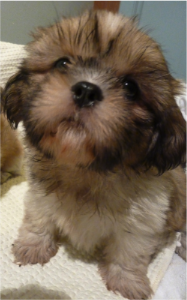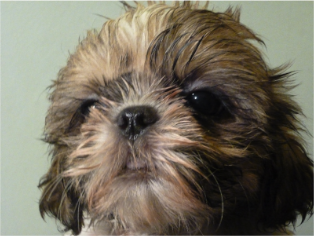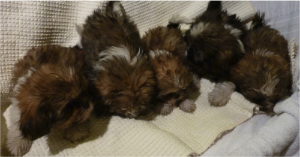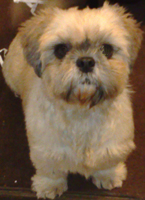
The Shih Tzu
Pronounced SHEET-sue, the name translates as Lion Dog in Tibetan. It was given the nickname Chrysanthemum Dog in England because the way their coat grows on their heads resembles a Chrysanthemum. Common mis-spellings are: Shihtzu, Sheetzu, Shitzu, Sheetzo. The plural noun is Shih Tzu, the same as singular.History
Shih Tzu are thought to originate from China or Tibet probably dating back to the 17th Century. They were considered so valuable that they were often given as gifts to the Chinese court. Introduced to the UK in the 1930s the Shih Tzu is still bred as a companion dog and house pet today. They were recognised by the Kennel Club of Great Britain in 1966.Appearance and Nature
With it's small and sturdy form, which is usually slightly longer than tall, it is happy, outgoing and affectionate and does make an ideal pet. They should carry themselves with a distinctly 'arrogant' carriage.
Shih Tzu have long double coats similar in texture to human hair and lose hair gradually (as humans do) rather than malting. It can be a variety of colours including black, red, beige, and white although a blaze of white on the forehead and tail-tip is frequently seen. A liver and white Shih Tzu with a liver-coloured nose is very rare. The Shih Tzu is one of many dog breeds with a hypoallergenic coat. They can be distinguished from the Pekingese by the topknot, or ‘pienji’, on its head. Shih Tzu lose hair gradually as humans do rather than shedding in the standard sense.
Height - shoulder height from 8 to 11 inches
Weight - between 9 and 16 lbs
Shih Tzu are intelligent, lovable, sociable, cheerful, happy and sometimes stubborn!
Health and Care
UK Kennel Club survey puts the average life span of a Shih Tzu at 12 years 2 months with most living between 10-16 years.
Special eye drops should be applied to keep the eyes clean, ear passages should be cleaned regularly, nails should be clipped monthly, and the face should be wiped after eating. Water can enter the Shih Tzu’s snout easily, for which reason some Shih Tzu are taught to drink from a ‘licker’ like a hamster.
Common health problems are liver shunt (a congenital circulatory disease), renal dysplasia (symptoms include bone fractures and ‘rubber jaw’), eye problems, and in larger dogs, hip dysplasia (malformed hip joint which can cause lameness or arthritis). Scratching in the absence of fleas may indicate an allergy to red dye number 40, a common food additive.
Shih Tzu cannot regulate their body temperature easily, which makes them highly prone to heat exposure; they should never be over exercised or left outside in hot weather. It is worth noting that many airlines that ship dogs will not accept them for shipment when temperatures at any point on the planned itinerary exceeds 75 °F (24 °C).
Shih Tzu require an ample amount of exercise for their small stature although they are happy with daily walks or romps in the yard. The Shih Tzu is well suited to apartment life.
Feeding
Just like humans, too little food will not offer the dog enough nutrients and vitamins and a Shih Tzu will not be able to properly grow. Health issues will eventually appear is a dog is underfed for an extended time.
When your Shih Tzu is still a puppy you should feed your dog 3 times each day. You can also give your dog some treats in between meals as long as they are healthy. An adult dog should eat once per day. After the age of 3 months, it is recommended to never "free feed", this means that you should not leave out dog food for your Shih Tzu to eat whenever they wish and meals should be scheduled. Puppies should eat an ounce of food (28.4 grams) for each pound that he or she weighs and adults a 1/2 ounce per pound.
Is Human Food Okay? Well yes and no. Processed human food is undoubtedly not healthy for your Shih Tzu but home cooking is highly recommended. This does not mean that you would give your Shih Tzu your food, you should prepare simple, yet extremely healthy home cooked meals to provide optimal health.
The best foods for a Shih Tzu are, you will want meat to be the main ingredient, followed by vegetables and then starch:
- Organs - Liver, heart and brain
- Lean Cuts of Meat - boneless white breast chicken, lean hamburger, lamb
- Fish
- Vegetables - Shih Tzu usually just love mashed potatoes and other healthy veggies such as broccoli and carrots
- Starch - Given in the form of rice and pasta
Nutritional wise a Shih Tzu (and all other dog breeds) need to have:
Dangerous Foods for your Shih Tzu - some are quite surprising:
- Amino acids from protein
- Fatty acids
- Carbohydrates
- Vitamins
- Minerals
- Water - Fresh, clean water should be available at all times.
Dangerous Foods for your Shih Tzu - some are quite surprising:
- Grapes and Raisins - it may seem odd that such a healthy fruit for humans can be so dangerous to your Shih Tzu; however these foods can cause serious kidney damage and it does not take a large amount
- Chocolate - most people have heard that chocolate may not be good for a dog; the facts are that it can cause seizures, coma and death to a small dog such as the Shih Tzu
- Onions - beware of giving any meat to your dog if it has onions on it or mixed in. This can destroy a dog's red blood cells.
- Coffee, Tea and Soda - ccaffeine can produce seizures, coma and eventual death
- Salt - a large quantity of salt will cause kidney issues
- Macadamia Nuts - this expensive and sought after nut can do great harm to a Shih Tzu or any other dog, the results of ingesting this can be muscle tremors and paralysis.
- Fruit pits and seeds - a healthy food to humans but dangerous to your Shih Tzu, all fruit seeds and pits can cause a range of medical issues including breathing difficulty, and/or fluids that fill up in a dog's abdomen and heart, some fruit seeds can kill a Shih Tzu within 24 hours!